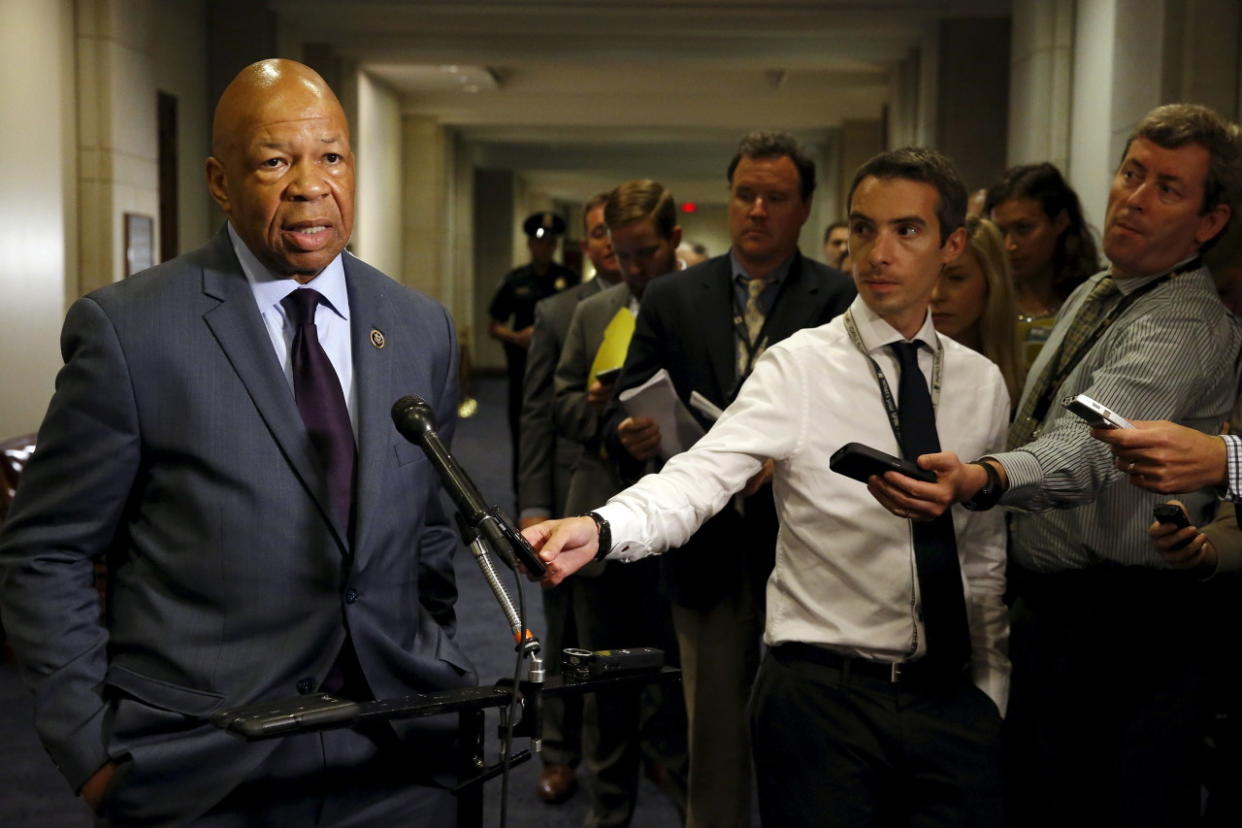After 608 days, the Benghazi panel by the numbers

Top Democrat on the Benghazi committee Elijah Cummings of Maryland addressed reporters after former Secretary of State Hillary Clinton’s appearance before the committee in October. (Photo: Jonathan Ernst/Reuters)
Democrats have long charged that the special committee established by House Republicans to investigate the 2012 attacks on an American consulate in Benghazi, Libya, was designed to harm the party’s frontrunner, former Secretary of State Hillary Clinton, in her 2016 bid for the White House.
Now that 2016 has arrived, the Benghazi committee is back to work this week, scheduled to interview former Central Intelligence Agency Director David Petraeus behind closed doors Wednesday and former Defense Secretary Leon Panetta Friday.
To mark the occasion, the select committee’s Democrats, led by Maryland Rep. Elijah Cummings, are seeking to call attention to the length of the investigation (608 days and counting), its $5.5 million cost, and what Cummings and his colleagues regard as its partisanship and lack of concrete results — compared, say, to the 9/11 Commission, which took less time for a vastly more complicated investigation, and handled it in a bipartisan fashion.
The Benghazi committee, to date, has held four public hearings, compared to 19 for the 9/11 investigators. The 9/11 Commission interviewed more than 1,000 witnesses in private and had 160 public witnesses testify. The Benghazi committee has privately interviewed 62 witnesses, in addition to the seven witnesses who have publicly testified before the panel — including Clinton herself, for 11 hours in October. The 9/11 Commission had a joint, bipartisan staff, which issued 13 subpoenas; the Benghazi committee has separate Republican and Democratic staffs, and all 11 of its subpoenas came from the Republican side, with no input from the Democratic minority.
The Democratic strategy is to keep challenging the process of the panel as a means to discredit whatever final report the Benghazi committee produces, if it produces one at all. The committee has an unlimited budget and no time limit to complete its work, except the expiration of this Congress. In 2015, Republicans were content to silently approve the panel’s reauthorization in 2015 without a recorded vote.
“The Select Committee’s investigation of the Benghazi attacks has been widely condemned as hyper-partisan and ineffective, and it stands in stark contrast to the bipartisan investigation and report issued by the 9/11 Commission,” said Cummings, in a statement. “Instead of following the bipartisan model set by the 9/11 Commission, which brought our entire nation together after we were attacked by terrorists, Republicans created a highly partisan Select Committee with an unlimited budget to attack their political opponents. Republicans continue to drag out this political charade closer to the 2016 presidential election, and the American taxpayers continue to pay the price.”
A spokesperson for the Republicans on the committee accused Democrats of using taxpayer dollars merely to generate press releases attacking the work of the panel.
“Democrats on the Benghazi Committee continue to waste taxpayer dollars playing politics and issuing stupid, meaningless press releases that are inaccurate to boot. Their complete lack of interest in getting answers for the families of the four Americans who died because they were left without adequate security on September 11 in one of the most dangerous places in the world is grotesque,” said spokesperson Matt Wolking. “If Democrats would actually assist with the investigation instead of undermining it – and stop acting as a full-fledged arm of the Clinton campaign – perhaps the committee wouldn’t still be waiting for crucial documents and witnesses to be produced by the administration.”
Wolking also noted that the 9/11 commission did not formally close on the day it issued its report and that the panel officially terminated in August, a month after issuing its findings.
Nine previous reports on the Benghazi attacks, including one each by the Republican-led House Intelligence and Armed Services Committees, have debunked most of the conspiracy theories surrounding the events that day at the consulate and the administration’s response to the attacks. Before Petraeus and Panetta were called, most of the Benghazi committee’s high-profile interviews were with State Department employees and top Hillary Clinton aides and allies, whereas other reports looked more comprehensively at the Department of Defense and CIA in addition to State.
Democrats, from the panel’s inception, have accused Republicans of refusing to define the scope of the investigation, and the House GOP has not announced a target date by which they would like Chairman Trey Gowdy, R-S.C., to complete his work. Meanwhile, new Speaker Paul D. Ryan, R-Wisc., has said repeatedly that he wants his conference’s focus in 2016 to be on ideas and policy. If he means it, then the Benghazi committee — which Ryan’s No. 2, Majority Leader Kevin McCarthy (R-Calif.), insinuated had the goal of damaging Clinton’s reputation when he was running for the top job — would seem out of step with that agenda.
This story was updated to include a statement from a spokesperson for the Republicans on the select committee.

